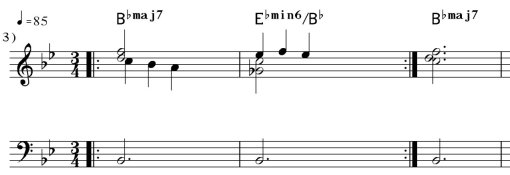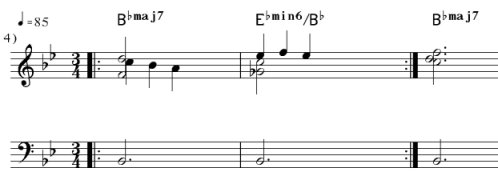

|
Player's Journal 2004 2015 2014 2013 2012 2011 2010 2009 2008 2007 2006 2005 2004 2003 2002 12/25/2004 Concern with sound 
Holidays are times for reflection. This morning I browsed through my journals and found an entry on Kenny Burrell. I wish I had written more at the time. February 25, 1989 Kenny Burrell did a "master class" in 1A for faculty and 20 select students, a clinic and a concert at Berklee last week. I thought the master class would be just that: Kenny working with one student at a time and teaching. But it was just a normal clinic. He answered questions and played a little. The clinic the next day was the same. He made a few good points, but I think generally was uninspiring. Still, it was good to have one of the great veterans of jazz there. I liked his concern with sound. He used one of the department's Roland cubes. He spent about a minute just looking at the controls, then played a chord, then adjusted the controls ever so slightly, then again. And as he played he kept adjusting his tone and volume controls. He seemed very aware of the sound of the room, whereas so many players have one setting and use it no matter what room they are in. 12/20/2004 THoTH evolving I've modified the mode search pages so that some tunes in the results list have links to analysis files produced by THoTH. For example, if you search for tunes with Mixolydianb9b13, the list will contain "Blue Bossa" with a link that takes you to the analysis page. I'll provide more explanation as time goes on. 11/24/2004 Blue Bossa Once again I noticed that one of the most frequent searches that brings people to my site is "Blue Bossa." This month, the second most frequent search string is "blue bossa chords." I guess a lot of teachers are using "Blue Bossa" as a homework assignment and students are hunting out resources on the web. I'm pleased to think that some of my examples may be helpfull. The first time I heard "Blue Bossa" was in the early '70s. I was at a concert in the Berklee Performance Center. I don't remember much about it, but I do remember hearing a group that included Gary Burton on vibes and Abe Laboriel on bass playing "Blue Bossa." Jazz-rock was a relatively new style at the time and I remember being thrilled by this performance. What was it that I found so thrilling? The virtuosity first of all. But also the rhythm. Here were they rock rhythms I'd grown to love, but combined with the bossa rhythms I'd heard from Getz and from Horace Silver. Also, there was a smattering of the blues elements I'd heard from Paul Butterfield, Howlin' Wolf, and so many others. Over the years, "Blue Bossa" lost it's luster for me. Students and faculty started calling it "the Berklee national anthem" because students played it so often in audtions and ensemble exams. But tunes only lose their luster if we let them. Last summer I did a gig with Joe Finn, and, to my surprise, he called "Blue Bossa." I hadn't played the melody in years. I took a few seconds to try to remember the melody, but could not. Joe, gentleman that he is, took the head and got us into the tune. I had a great time playing the tune, and by the out chorus I'd remembered the melody and took it out. It was a good lesson: Joe had not let "Blue Bossa" lose its luster for him. I had a less enjoyable encounter with "Blue Bossa" in a trio gig at the Kirkland Cafe in Cambridge earlier in the year. (I think I've written about that gig in my Player's Journal.) The drummer was so overbearing that I found it hard to phrase. Interesting: I just looked up overbearing in the dictionary. "To crush or press down upon with physical force....To prevail over, as if by superior weight or force; dominate." Sounds like all too many drummers. 11/06/2004 Body and Hand Position I just scanned in a copy of "Body and Hand Position: The Foundation of Technique" from my Guitar Player Musicians Health Series. It's now available from a link from Articles. 10/10/2004 Think fast In jazz, sometimes it's more important to be able to think fast than to be able to play fast. You have to know the fundamentals of music so well, that they are second nature. At first you have to think about them, but after thinking about them enough, the thought process becomes instantaneous. Here are some exercises that will help you think faster in music. Steve's Mental Calisthenics CYCLE 5 Cycle 5 refers to a root progression down a perfect fifth (or up a perfect fourth). The cycle of fifths (a.k.a. cycle of fourths and fifths, cycle of fourths, circle of fifths, cycle five, etc.) is often written in a circle because starting at any point will eventually bring you back to the same point. I prefer to think of it as an endless straight line: ... C F Bb Eb Ab Db Gb B E A D G C... You need to memorize this so that you can recite it as fast as you can spell your own name. One trick that helps with this is to notice that the word BEAD occurs in there. BEAD is followed by G, which I remember as part of BEAD GAME. Notice also that starting with Bb, the key names also spell BEAD Game. So you can just remember: C then F then BEAD GAME twice (once with flats, once without). Practice reciting Cycle 5 first starting from C and ending on C, then starting on F and ending on F, and so forth, until you can recite it, starting on any note, in whole notes at MM=60. Keep at it until you can do this in eighth notes at MM=120. Since many chords have their roots on the fifth and sixth strings, it is important to be able to find any note on these strings. Cycle 5 can help you with that. You can do this away from the guitar by just visualizing the neck. (This may be difficult at first, but the more you do it the easier it becomes.) Think of the open E string. The next note in Cycle 5 is A; it is five frets higher on the neck. The next note is D, again five frets higher on the neck (not counting the one you are in). The next note is G, which would be five frets higher again, but that would put you in the 15th fret, which is too high to play a root 6 chord, so move down to the third fret. The next note is C, five frets higher. Next is F (either five frets higher, in fret 13, or fret 1). Continue: Bb (fret 6), Eb (fret 11), Ab (fret four), Db (fret 9), Gb (fret 2), B (fret 7). Next is E, which is where we began. Repeat this whole process on the fifth string, starting with the open note, A. A good way to become familiar with a new chord is to "run it through the cycle of fifths." As an advanced mental calisthenic, try to do this with, say, a major 7th chord, root six, visualizing and naming not just the root of each chord, but every note! (CAUTION: do not perform these exercises while driving, operating heavy equipment, or crossing city streets.) 10/09/2004 Triubute to Bill 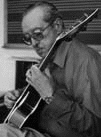
I got an email from Alisdair Macrae Birch, a guitarist who lives in NY. He has a web page that is a tribute to Bill Leavitt. I did a search of the internet and found little on Bill. There's a nice page about Karl Aranjo, where he talks about Bill. I remember Karl well. Seemed like he was always coming into Bill's office bearing two cups of coffee, one for himself and one for Bill. Karl is a soft-spoken guy who loves guitar and who really appreciated Bill's wisdon and openness. Bill took me under his wing in 1972. I had been teaching guitar at a small music studio, and, even though I'd never had a guitar lesson in my life, I wanted to teach at Berklee. My wife convinced me to call Bill Leavitt and make an appointment for an interview. I did, and the rest is history -- a history that I will relate, a bit at a time, in this journal. 10/02/2004 Found Cadence One of my regular exercises is to play half-note chords on a ballad. Sometimes I do this for techinique. In that case I use a set of voicings that I've worked out for the tune and I try to play with minimal silence between chords. To achieve this, the left hand must move efficiently. At other times I'll look for new combinations of voicings, new voice leading. I might set up a rule for the exercise: stay in a certain area of the neck, for example. Last night this exercise led me to an interesting cadence for "Body and Soul." 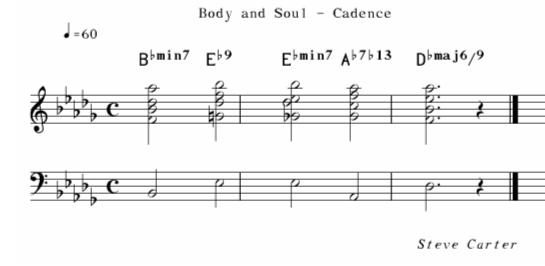
I made an MP3 file, playing the bass part on my Travis Bean fretless and the chords on my Aria. Click here to hear the MP3 file. 09/25/2004 Coffee Shop Reflections I got involved in a thread on rec.music.makers.guitar.jazz recently that got me thinking about a lot of things. The thread was about Starbucks Muzak. Joe Finn mentioned that he had played some gigs at Starbucks. After a while Starbucks stopped paying professional musicians and started using "amateurs." Taking advantage of people's love of performing. I'm sure they don't use amateur plumbers, electricians, or carpteners. Certainly not amateur PR people. Joe Finn made another intersting observation: The big players in the global franchise game are trying hard to force consumers into a little box where the choices are few and the scenery never changes. I hate this sort of thing. It's appalling. I agreed and added: I never played at Starbucks, but I played in the coffeeshops of Barnes & Noble and Borders. At that time they paid me in gift certificates. Good deal, since I love to read. After a while they started using amateur musicians. Amateur in the sense of free. I refuse to play for free for a corporation, unless I have some good personal reason to. This has been discussed in other threads, but I think it's sad that the public will pay outrageous prices for bad coffee, but won't pressure corporations to pay for good music. Carbury's is another chain that uses free music. Ugh. But even small mom-and-pop stores can be insenstive. There's a bookstore in the small city where I live that is run by a husband and wife. Nice place, pleasant people. I offered to perform free for them and did a couple of gigs there. I also played there, for free, when they hosted part of a local festival. Never once did they offer me even a small gift certificate. But worse than that, they proposed that they sell my CDs, which they did. A couple of times (once when I was playing there for free) they told me they'd sold a few. But they didn't offer to pay me for them! I was damned if I was going to ask. Now I know that's stubborn, but these people should have had the decency to just hand me a check, or a few dollars from the till (it was only a few dollars), rather than make me beg. Last week I played a local fundraiser and the owner of the bookstore was there helping out. We chatted for a few minutes. It apparently never crossed his mind, "Oh, I owe you a few dollars." I don't go in that bookstore any more. Elsewhere in the thread, Max Leggett observed: it's the really shoddy coffee they sell that cheeses me off - there's no excuse for it. I responded that Starbucks didn't really care about the quality of their coffee. Go to their website and it's not about coffee. Clink on the Our Stores link (today) and you'll see them exploiting the late great Ray Charles. But they won't pay living musicians. Someone, justifiably, jumped on me about my glib comment that Starbucks didn't care about coffee. I responded: Ok, I overstated my point. I didn't mean to say they don't care about quality (whatever that may be), but that they weren't terribly dedicated to the "purist" coffee drinker, those who drink it black and want a certain coffee flavor. Now, I realize that's "a matter of taste." But I think they would be more honest if they presented themselves as "purveyors of coffee flavored drinks." Just my opinion. However, as for how they treat their workers, well, I stand by my position on that. In the Boston area, virtually every Starbucks has a help-wanted chalkboard out front. There's good reason. There was a good article about Starbuck's and unions on Zmag: http://www.zmag.org/content/showarticle.cfm?SectionID=19&ItemID=6189 I didn't check the veracity of the details, but given what I've learned from my daughter's work at Starbucks, and what I've learned from my own corporate and union experience, it all rings true. And I may be making an leap that can not be supported, but I think there's a relationship between the way they treat the baristas and the way they treat musicians: underpay the former, don't pay the latter at all. As I said (and as Joe Finn said), it's not just Starbucks. A while ago I went into the coffee shop of the Barnes & Noble where I had gigged a few years earlier. My wife went to the counter to get us drinks while I grabbed a table and plopped down our pile of books. She came back and said, "I wanted to leave a tip, but the girl said, 'Thank you, but we are not allowed to accept tips.'" Are they paid that well that it compensates for tips? I doubt it. What is management worried about -- that the help may be nice to the customers "just to get a tip." Heaven forbid! For decades I've been performing in all sorts of places. I resent it when grumpy, incompetent bartenders make in a night twice what I make as a musician. I have great sympathy for the waiters and waitresses, who are almost always grossly underpaid, and all too often poorly tipped. I remember the last night I played at that Barnes & Noble. At the end of the night, the girl at the coffee bar thanked me for the music and said it made her night so much more enjoyable. She said, "I just couldn't believe that all that music was coming from just one guitar." I don't think she works there any more. Neither do I. 09/25/2004 Want to read There are two gig journal entries that I've been wanting to write, but putting off. The duo gig at One Caroline Street with Joe Finn, and the trio gig at the Wildcat in Jackson Village, NH. I've been putting them off not because I don't want to write them, but because I want to write them right. Each gig was intense in its own way, and enlightening in many ways. But getting that into words is not easy; it will take time, and time is something I haven't had lately. Over the years, many people have told me I "have a way with words." A more accurate statement might be that, when things are going well, words have their way with me. I'm hungry for good writing, and, in spite of the overload of words online and in print, there is precious little good writing to be found these days. I want to get it right. I want to write something that I would want to read. Not easy. 08/16/2004 Coffee Shop Revisited 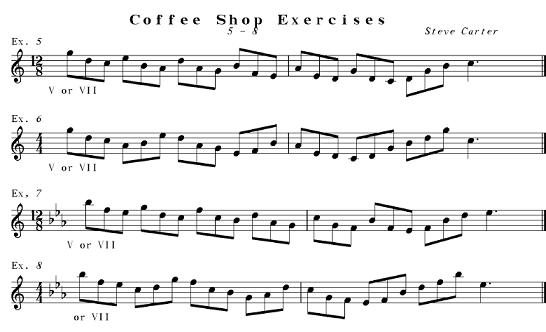
As I mentioned earlier in this journal I've been writing exercises as text on my Palm and then later notating them in MusicPrinter Plus. I wrote a new set of exercises yesterday. The pdf is here. 08/16/2004 North Country We're taking a short vacation to visit our friends Mike Scott and his wife Sandy in the White Mountains. Mike and I are going to play a short gig at the Wildcat Inn with Mary Mitchell. Should be fun. I'll write it up in my player's journal. That reminds me, I need to write up the August 1 gig with Joe Finn. That was a great gig. I wish I'd written down more of the details right after the gig. I learned a lot. As the night evolved I made some mental notes about tunes and things I need to work on . Got to get them down in the journal.08/07/2004 Thou Swell Bean 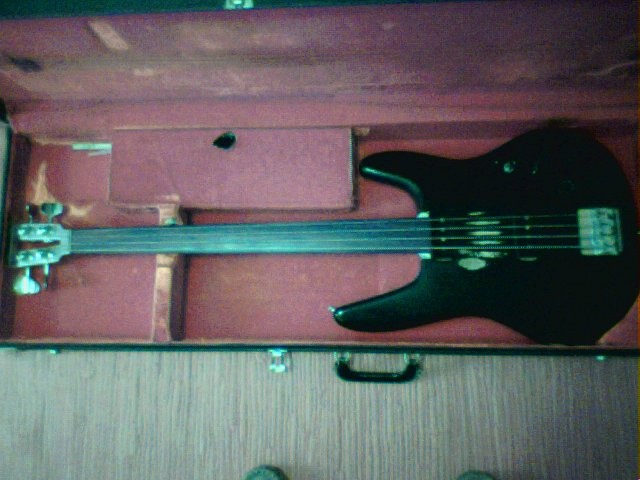
A few months ago I got an email with the subject line "Wow a Bean Fretless." It was from a guy who had seen the photo of my Travis Bean fretless bass. He commented that he had played Fender fretless bass, and had played Travis Bean fretted basses, that they were fine instruments, so a Bean fretless must be a treat. Indeed, it is. I dug out a tape I'd made playing the Bean with the Eastwood Swing Orchestra and made an MP3 of it. "Thou swell." An appropriate tune for this ax. 07/29/2004 Work-hardened When I was writing my Musician's Health Series for Guitar Player Magazine, I got an email from a doctor who played electric bass. His hands had been bothering him when he played and he realized he hadn't changed the strings in quite a while. He said new strings offered less resisitance. I'd never thought of that. The next day I ran into Earl Pugh in the hallway at Berklee. Earl was a guitar student there at the time, an older guy who had spent many years as a mechanic, and who had a great knowledge of guitar repair. I mentioned the idea of new strings offering less resistance and asked him what he thought. He said, "Well, I never thought of it. But when I was working with sheetmetal I learned that if you take a piece of sheet metal, bend it, straighten it, then bend it again, it will not bend at the same place the second time as it did the first time. The area that bent has become work-hardened. I guess every time you fret a string, it gets a little work-hardened." I checked my Palm datebook tody and saw that the last time I'd changed strings on my Aria was last November, so I changed strings. Then I set about work-hardening them. 07/18/2004 Connected I'm starting to practice more regularly now, getting in shape for the gig with Joe Finn. Really looking forward to that. Practicing on the front porch this morning, as usual I warmed up with scales and arpeggios. Then played through chord solo for "My Foolish Heart." Left hand needed some work, so I came up with a chord exercise on a section of "A Foggy Day." Sounds good. Pretty easy to play, but, as always, the goal is to play it as legato as possible, connect the chords, make it flow. Slight crescendo. 07/18/2004 Lost Connection Recently I've been writing the history of the Blues Children. I've been out of touch with them for more than 30 years, and I often wonder what happened to each of them. The other night I was at my niece's wedding, talking with my brother. He happened to mention the George Mizrahi's wife was working in the store he manages. I said, "I've lost touch with Miz over the years. What's he up to these days." My brother hesitated for a minute and said, "Oh, he died, what, maybe twenty years ago. Heart attack or something." Odd how sad that made me. I remember getting a phone call from Mizzy one Sunday morning, maybe 25 or more years ago. It was early, I'd been out on a gig the night before, and I'm the type of person who needs at least one cup of coffee before I'm at all socially acceptable. I asked Miz if he'd call back a little later. He never did. Sad how people who were once important to you pass out of your life. All the more reason why I have to tell all the stories about Mizzy. 
07/09/2004 Expressive Intonation Eisenberg, Maurice. The Way They Play Excerpt from an interview with Pablo Casals. To play Bach may seem simple to some, but if we consider further, it is amazing--perfectly amazing--how much thought and study, how much knowledge, is involved in order to perform his works intelligently. It is of course assumed that one of the requisites is an understanding of the harmonic and structural background suggested by the composition under consideration; the player must understand the idea of the composer in the suspensions and the leading-up, or anticipations which resolve themselves in the phrasing--he must be able, theoretically, to make an analysis of each part of every movement. Bach sometimes appears to demand something that seems impossible to deliver! As though a quartet of voices should be at the command of one performer! His methods of procedure exhibit a wonderful fund of ingenious inventive ability. He proceeds in continuous movement, harmonic changes, unique accentuation, suggesting that which is to come by the use of chords and chord progressions. [the editor] noted: "It is wonderful to note his way of employing the different strings to subtly prepare the contrapuntal development by which the listener obtains the impression of the whole!" Ah, yes! If we consider, as an example, the Bach Suites for violin, there are many movements which do not seem to offer major technical difficulties, yet there are many violinists who find it beyond them to play them interestingly. Why can so few take a Prelude, or an Allemande, and make it live? Suppose for analysis, we consider the medium of the tenuto, so important in interpreting Bach's intentions to bring meaning and contour, yet demanding that the greatest caution must be exercised in employment. An apt comparison may be suggested with the subtleties of enunciation which make the reading of poetry either rich to the ear or flat and meaningless. Indeed, it must always be recalled that Bach's work is of poetic structure, constantly demanding that certain parts be stressed, others subdued. In thus portraying the scheme, notes will be found in scale passages, or arpeggios, interspersed here and there, which require more or less accentuation to tell their meaning and which, often, if removed from the phrase and played separately, are found to form a melody, or the theme about which the other notes are woven. The sense of perfect rhythm is an important requirement, particularly to correctly interpret Bach's use of the dance forms. I will go so far as to say that one must possess a strong sense of basic rhythm, we might say as in the modern dance forms. The rhythm must be practically metronomic, and yet, paradoxically, the performance must contain much rubato, freedom, as well as the expression of fantasy and rhapsody! Another point: I feel that intonation is often sorely neglected in the playing of Bach. I do not mean to say by this that I refer merely to playing 'in tune.' Nor do I mean necessarily, tempered intonation. Rather, something which might be termed 'expressive' intonation. At the piano, each note is tempered to the other. By ex-pressive intonation, we raise or lower notes which are modulato-ry, such as sevenths, and minor thirds, which should be lowered. Thus, we present a certain character, quality or color--a really difficult thing to attain. For instance, one can play Paganini with piano accompaniment without finding fault with the intona-tion. Yet, play Bach, and the intonation often fails to be quite good enough! What the performer is obliged to do, is to prepare the listener for an approaching change of key, and to do so by anticipation. In on measure an A flat is played and will sound a certain pitch. Two measures later, the A flat may have to be made a little lower because of a change of key. This element of intonation you speak of has not been sufficiently stressed," I put in, "whereas it should be really an important part of one's training. Of course it should," he assented. "I have a feeling that many musicians lose this sense because they become too concerned with mechanical perfection. But of course, teachers must be careful in cultivating this subtle sense. It should not be presented before the pupil is capable of discerning it, lest there be too strong a tendency to exaggerate, There are some methods, old-fashioned of course, which teach the principle of equal distance between every half tone. In olden days, players were even instructed to practice with corks between the fingers in order to place the notes in a tempered manner. As you will understand, this mechanical progress could hardly stimulate beautiful, sensitive playing! 07/08/2004 Focus Madsen, Clifford. From "Council for Research in Music Education 105" (Summer 1990): 45-47 BME What musicians vs. non-musicians focus on while listening to music. Musicians:
06/27/2004 Tune Lists for Learning I have a database of tunes that I've been building up for years in THoTH. I'm in the process of rewriting THoTH, but in the meanwhile I wanted to make some of the information available, so I developed a couple of pages that bring back lists of tunes. SelectChordTypes.php shows a list of chord types, allows you to pick one or more, then shows a list of tunes that use those chord types. Good for students who are learning new voicings. ListTunesForMode.php shows a list of modes, allows you to pick one, and shows a list of tunes that use that mode. Good for students learning to improvise with modes. Bibliography I just posted a music bibliography. I'll refine it later. Mademoiselle Madomoiselle, Conversations with Nadia Boulanger. Bruno Monsaingean Carcente. Manchester, 1985 w/chronology, discography, index . . ....I believe that a teacher depends on the quality of his students... p. 15 The great privilege of teaching consists in getting the students to really look at what they think, to say what they really want to say, and to understand clearly what they hear. For this it is absolutely essential to have a good grounding in language, I did neither Latin nor Greek, and I'm very often aware of the gap that this has left. In music I have my limitations, I'm aware of all that I don't know but I'm sure of a solid ground because I've been led, I've been helped and trained to really understand, to listen properly. And I think that here again my mother's influence has predominated, because she didn't allow me to do anything without paying proper attention. p. 22 I had a surprise when I fond myself in Faure's class and discovered Ravel was there too, doing, as I used to do them, traditional counterpoint. I was insignificant, and did counterpoint, I didn't always find it interesting, yet it seemed quite natural that Ravel should do it. I did it, he did it, we did it... It was only years later that I realized that he had already written his string quartet and, I asked him why he was still studying counterpoint. 'One must clean house from time to time; I often do it that way,' he replied. pp. 25f Do we behave as if this gift of learning, of retention, is a great favour granted to us, or do we let the days pass through like a sieve in which nothing remains? And is the residue in the sieve really an acquisition or just running water? Running water is water lost. p. 27 Amazing Stories It's amazing the stories I've yet to tell in this journal. I've been keeping this journal online for more than a year and yet, looking it over. I see how many influential people in my life I have not yet mentioned. As I write this, I'm listening to Jack Jarrett's music. I've written a little about Jack in my THoTH pages (see the History and MPP Code links). Jack is one of the few geniuses I've met in my life. I don't have time to write much about him right now, but I'll have to get to that. Meanwhile, listen to his music. Also check out his "Concertino," available on Denouement Records. 06/25/2004 My Girl My first gig with the Blues Children was in a club in Brockton. This was my first club gig ever. There were only about five customers in the club, sitting at the bar with their backs to the bandstand, but that didn't prevent me from being pretty nervous. We opened with "My Girl." On the record, the bass just plays root and fifth, but Mercon had arranged it so that I played the signature line of the tune, since he was going to be playing the horn parts on guitar. I can still remember playing those first few measures. My first club gig, and here I was opening with a solo! After four bars, the rest of the band came in and I was on my way to brief but exciting career as bassist for the Blues Children. Some thirty-odd years later I played bass on "My Girl" with the Eastwood Swing Orchestra at our semi-annual Newbury Street Fair gig on the corner of Exeter and Newbury streets in Boston. I had written an arrangement of the song for the band (trumpet, tenor, trombone, 4-piece rhythm section), and I sang it. It went pretty well. After the gig, as we were packing up, I was carrying the head of my Ampeg to my car (which I had been lucky enough to park just a block down Newbury Street) and a young guy on the sidewalk said to me, "You're very talented." For a split second I thought he was being sarcastic, meaning that my talent consisted of carrying equipment -- such is my self-deprecating nature, probably due to my father's life-long habit of putting me down. But then I realized that he had listened to my arrangement, my singing, and my bass playing, and that he was serious. I said thanks and continued packing up. A moment to reflect on. 06/25/2004 Buy the Bean 
Every time we played on Newbury Street, which we did twice a year for several years, the same guy would come up to me and ask if I wanted to sell my Travis Bean bass . He worked down the street at a music store, and he really wanted the Bean fretless bass. Every year he'd ask, every year I'd say no, every year he'd give me his phone number on a slip of paper, saying, "If you change your mind..." The Bean spends most of its time in the closet these days, but I'm not about to sell it. In fact, I have some projects in mind for recording in my home studio and the Bean has a role to play. 06/21/2004 Chord Etudes Analysis 
I got an email from a guitar student in Taiwan who is working on the chord etudes in Volume 2 of Bill Leavitt's Modern Method for Guitar. He had written to me earlier, when he was starting on the chord etudes in Volume I and I advised him to analyse them. He wanted help with the analysis, so I wrote up an analysis of Chord Etude #6 and posted it , along with the chord etude, on the Lessons page I found these chord etudes very helpful for developing voicing ideas that could be extracted and used for comping and chord-melody playing. If you look at my arrangement of Cute, for example, you'll see that the some of the voicings come straight out of Leavitt. I plan to provide analysis and comments on all 12 of Bill Leavitt's chord etudes. A lot of guitar students are turned off to much of Leavitt because of the style. I reworked a couple of his etudes to demonstrate that the style can be changed or the materials modified slightly to be be "hipper." Here's a link to a soundfile of one example I taped about 10 years ago. I recorded a sort of rock ballad bass line for the changes to Bill's duet "That Late" (Vol. 3), and played the top guitar part over it. Sounds quite different from Bill's duet. (The bass is my Mosrite and the guitar is my Guild T-50. It's at 256Kbps, because I want as deliver as much of the sound quality as I can, so the file is 3.71MB, so guys with dialup be advised it will take a while to download.) 06/21/2004 A professional ax After my audition with the Blues Children, Miz said to me, "I don't mean to insult your ax, man, but now that you're part of the band, you really need to get yourself a professional ax." I was a bit offended. My bass was straight from England. The Stones were from England, the Beatles were from England, so my Egmont bass must be good, I thought. It was crap. The strings were about an inch away from the neck. The instrument produced more of a thump than a note. Miz was right. Fortunately, Miz took me under his wing, and advised me on buying a bass and amp. But that's a story for another time. Cluckie is born When I started gigging with the Blues Children, I didn't have a car. Miz volunteered to provide me with transportation to all the rehearsals and gigs. He proclaimed me his official sidekick. "Every sidekick has to have a name," Mizzie said. "Let's see. Ah! I have it. You're my sidekick Cluckie!" So for the next five years I was Cluckie, or the diminuative, Cluck. We'd often stop at a coffee shop on the way to a rehearsal or gig. After we had finished our coffee, Miz would look at me and say, "Alright, Cluckie. Let's" -- making a popping sound with his mouth and bringing both hands down over his head, one in front, one in back -- "hat up." Sometimes he's shorten it to, "Cluck, let's hat." 06/19/2004 Audtion In 1965 I saw an notice posted in The Coffee Cup in Weymouth, where I used to hang out. Something about a blues band looking for a bass player. I wasn't sure what a blues band was -- I was a suburban white kid -- but I played bass and I was looking for a new band (having just left The Fabulous Fathoms, nee The Delvons). The notice said to call Jim Malone, and listed a number, so I called. Jim told me the name of the group was James and the Miseries. At the moment it was two guitar players and himself, they had just found a drummer they were about to audition, and they need a bass player. I asked Jim, "What instrument to you play?" Jim said, "I'm the front man." I didn't know what that meant, so I just said, "Oh." I thought maybe it meant he fronted the money for the band. Of course, it meant he was the singer. Anyway, he informed me of the time and place of the audition, and said, "We'll pick you up at The Coffee Cup." "You know where it is?" "Of course. I live just down the street from there." At the appointed time, Jim, Mercon, and Miz picked me up at "The Cup." The audition was at Al's house. I don't remember much about the audition, except that we played blues, of course. I didn't know much about blues, but I knew the three chords involved. Al was also auditioning at the time. We hit a groove together right from the start. From the talk between tunes, I learned that James and the Miseries had just opened for the Rolling Stones at the Worcester Auditorium. Miz had been on bass for that gig, and the rhythm guitar player had been Walter Lee. Walter had a lot of connections in the music business, and he was the one who'd gotten them that gig. When we packed up, I knew that Al and I were now part of the band. As I loaded my equipment into the car, I asked Mercon if he thought we'd be able to get work in clubs. I'd played a few teenage dances, but I'd never played in a club. Mercon, with his inscrutable smirk, said, "After what I heard in there, we'll be able to play in any club we want. He was, of course, overly optimistic. Though we never did get to the point where we could play in "any club we wanted," we did have a very interesting few years as a band. We quickly changed the name to the Blues Children. 06/19/2004 Chronology Now that I'm starting to write my memoirs here, the reader may have a hard time following things. I'd like to write everything in chronological order, but I know I can't do that. I need to get things down as they come to me. Since I make entries at the top of this journal, many of these stories will be appear to the reader (the "gentle reader," as Jonothan Swift addressed his readers) in reverse chronological order. So here, gentle reader, I make my apolgies. I you want to follow the chronology of, say, the Blues Children, for now you will have to go to some point on this page and work your way back. But the chronology is not really important. Even so, at some point I'm going to break this page up in to many pages, by date. I'll somehow create an index, so if you want to follow the antics of the Blues Children, or Mr. Clean and the Clean Men, or my days at Berklee, the index will help. For now, I just want to get it all down. Last week I went into the basement ("down cellar," as we New Englanders phrase it) and dug out the box of my journals, paper notebooks going back to 1969. Lots of stories in there. I want to get them in here. It will rambling, at first, but should make for a good read, nontheless. 06/13/2004 Memoirs Over the years I've played a lot of gigs with a lot of groups, and I've had some experiences that I found pretty interesting. I would often comment to my bandmates, "This will make an interesting chapter in my memoirs." I never did get around to writing my memoirs, but this player's journal is becoming my memoirs. There are a lot of stories I want to tell, especially about the days of the Blues Children, in the late 60's. Thinking about why I want to write those stories, reminded me of something E. B. White wrote: I spent several days and nights in mid-September with an ailing pig and I feel driven to account for this stretch of time, more particularly since the pig died at last, and I lived, and things might easily have gone the other way round and none left to do the accounting. --"Death of a Pig," Essays of E. B. White, p. 17 06/13/2004 Cast of Characters 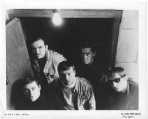
(Click to enlarge) From left to right in the photo:
The name is misspelled at the bottom of the photo. That was a typo by the photographer, so he gave us the first batch of prints for free. I guess we used all of the second batch, and somehow I wound up with this copy. Dave Wilson was our manager for a while. He also managed Barry and the Remains and Odetta about that time. 06/01/2004 Musical Instruction I'm starting to work on my guitar duets CD. Deciding which pieces will go in volume one, thinking about text, trying some recording on the hard drive, and so forth. I've been researching the market recently, and that's really discouraging. Last night I browsed a web site (http://www.chordmelody.com/newpage1.htm). An overwhelming list of books, CDs, DVDs, videos. If I were a young guitar student, I wouldn't know where to start. Some of the books are by people I know and respect, like Charles Chapman. I'm sure there's a lot of good stuff there. A lot of teachers say there are already too many guitar books out there. Even so, I plan to add another one. I'm hoping I can make it different by making it more musical, and by being more articulate. I visited TrueFire.com and sampled some of the sound files that go with the lessons there. The sound quality is horrible. The MP3s must be at the lowest possible resolution. Most of the guitar examples sound like they are being played through one of those old amps with tremolo. I want to make a CD of my duets with good sound quality. The nuances are essential! I visited the site for a well-known music chain recently, and sampled the videos for a couple of jazz guitar "lessons." I put the word in quotation marks because, if these samples were indicative, these were not lessons but hustles. I watched three 30-second video samples. In all three, the same guy sat there with an ES-175 on his lap. Not once in any sample did he even touch the guitar, let alone play a note! He waved his arms, said "jazz' a lot, and talked like a cool dude. It's a crime. There's room for some good music out there that also happens to be instructional. 05/21/2004 A Soggy Day I had intended to change strings early in the week, but didn't get to it. Tomorrow I have a solo gig and the strings are just not good. I'm having trouble getting in tune and staying in tune. Blame it on this humid weather. Every spring, for a few weeks in May, my Aria develops a strange vibration, almost a gurgle. Sounds a little like Louis Armstrong. I think it's due to the rapid changes in humidity, affecting the glue in the laminated top and so forth. The guitar sounds sort of soggy. This week it started to clear up. But now the strings sound soggy. 05/21/2004 Remembering John LaPorta John LaPorta recently passed away. There's a nice tribute article on allaboutjazz.com. A couple of stories about John come to mind. The first year I taught at Berklee I played in a recital with a student, Gordon Grant. (Later Gordon joined the faculty and we did lots of guitar duo gigs together.) I remember that we played "My Man's Gone Now." John was one of the teachers reviewing the concert. Afterwards, he talked to Gordon for a few minutes, criticizing lots of things. Then he turned to me and, in his characteristically deep, gravelly voice, said, "You play very well." John was not one to give compliments. That one often comes to mind, and it keeps me going. Once I was on a jury reviewing a student recital. John LaPorta and another teacher were also on the jury. The student, a guitar player, was blowing eighth notes over bebop changes. After a couple of choruses, John leaned over and, in a hoarse whisper, said, "Don't guitar players ever breathe?" 05/19/2004 Worth a try I got a call today from the manager of Hugh O'Neill's, the Irish pub in Malden. I had sent him a PR package, suggesting he try jazz on Saturday afternoons, since he already has jazz at Sunday brunch. He was very pleasant, said he enjoyed my CD, but it's just too hard to get people to come out. He's right, of course. We both wished we could make it work, but agreed it probably would not. Oh, well, it was worth a try. The pub has jazz brunch on Sunday. Mal and I will go there this Sunday, listen to the jazz duo, meet the manager, support local jazz. 05/16/2004 To Do I performed at Sheri and Jason's wedding a couple of weeks ago. It was a great experience, and I've wanted to write about it in my player's journal, but I've been too busy lately. I have decided that I'll create a special web page for it, complete with pictures from the wedding. 05/16/2004 IMA Next Saturday I'll be playing at a fund raiser for the Integrative Medicine Alliance. Should be a nice gig. Mal works for the organization and she'll be offering Reiki sessions. I'll set in a corner somewhere and play background music. The IMA is about healing; music can be a healing force. Few of the people at this event will listen closely. But the music penetrates into the unconcsious, anyway. 05/16/2004 Family Dinner At dinner I put on "Live at Shanghai Jazz." Marian McPartland, Rufus Reid, Joe Morello. I can't get enough of this album lately. I've been listening to it in the car driving to work. The Camry has a great sound system, but on the highway the road noise covers some of the bass. At home, on my Advent Legacy speakers, Rufus's low notes sound great. I heard Rufus live once. He was playing through two Bose 900's. Sounded great. I love his tone, his time. And of course, Marian is -- what can I say about her? Well, John Neves used to play with her. John used to talk about "the daddies of the instrument," his highest form of praise. So I guess Marian is "a mommy of the piano." Mommy Marian, Daddy Rufus, Uncle Joe. Nice to have the family at dinner. 05/11/2004 Search Strings I often wonder what brings web surfers to this site. I sometimes look through the web stats that my ISP provides. Here is the list of the Top 66 Search Strings for May. Some are pretty interesting, and suggest things I can add to the site. arpeggios: It's good that guitar students are looking for arpeggios. Too many teachers emphasize scales too early and for too long. Most of the best players I've known started by studying arpeggios and then learned to fill in with scales. bass exercises: Probably bass players entered this search string. I hope they take the time to look at some of the bass lines in my guitar exercises. If nothing else, maybe it will remind them of two simple truths: 1) keep it simple 2) don't be too proud to play the root. blue bossa chords: "Blue Bossa" is one of the first jazz tunes that players work on when making the transition from rock to jazz. It was for me, too. I remember hearing Gary Burton and Abe Laboriel playing it at a Berklee concert in the early 70's. It's still a good tune. Maybe I'll write some more exercises on it. chods piano beethoven: You can't get here from there! frogstoryrecords.com: Nice to know that people are searching for the site by name.whisper not chords: I hope the person who entered this search string found my arrangement and is practicing it. I think it's one of my better examples. I like the way the comping works rhythmically against the melody and bass. 04/26/2004 Walk-up In about 1967 I was living on Beacon Hill -- on what was at the time the poor side of the hill -- in a fifth-floor walk-up. I used to carry my Ampeg B-15 up and down those stairs. Ah, youth! One day I was walking down the stairs and guy who was walking up the stairs stopped me and said, "Are you Steve Carter?" "Yes." "You're band is the Blues Children, right?" "Yes." "My name is Jack Lynch. I own the Webster House. I want your band to play there." So it began. The Blues Children became regulars at the Webster House. There are many stories to tell about those days. I'll get to them. But I was reminded of this story the other day while I was putting together a PR package for a local Irish club that has just started having jazz brunches, asking them if they'd like to have me play a Saturday Jazz Cocktail hour. No good waiting for a club owner to walk up to me and offer me a gig. Those days are gone. 04/25/2004 Intermission Riffs When I played with the Blues Children in the '60s, we had a couple of break tunes. We played 40-20 sets (forty minutes on, twenty minute break), and signaled the end of each set with a break tune. One was a fragment from a Stan Kenton number, called "Intermission Riff." I haven't been able to find the time or the resources to start Act Two, but a lot of friends have been asking when I'm going to put out another CD. One friend told my wife, "Steve should just record everything he plays." So I've decided I'm going to record a solo CD in my home studio, just for friends and family. I'm going to call it "Intermission Riffs." 04/23/2004 Spring seeds Spring is a good time for starting new projects. I'm starting two recording projects: my instructional guitar duets book/CD, and practice tracks for Act Two. I just bought a new device that will make recording easier, an Edirol UA-20 USB Audio Capture box. It has right and left quarter-inch inputs and USB output, among other things. I've got it hooked up to my laptop, a Dell Inspiron with 348MB RAM, 30GB hard drive. So I can plug my guitar in and record in mono or stereo using N-Track Studio. I've tried a couple of takes and it works well. The plan for the duets book is to make a CD with both parts, so students can turn off one track and play the other. I have all the music in MusicPrinter Plus, so I can make PDF files. I might make the PDF files and MP3 files available for free on my site (or at least some of them), and charge for the CD with printed book. 03/29/2004 Feeding the writing habit Only had a few minutes to write tonight. Sketched out a couple more chord etude fragments. Have to get back to these at some point.
These are to be played on strings 2, 3, and 4. The bass not is just there to indicate what the bass player would play. When I play these back as MIDI files, with a piano patch and transposed down an octave to get in guitar range, they sound so bland. But on the guitar they have richness, color, personality. Reminds me of something John Neves said. One night on a gig someone came up to him and said, "I really like they way you bring out the colors of the instrument." When John told me that, he did one of his famous pantomimes, pretending to write on the palm of his hand, then looked up, raised his eyebrows, and said slowly, "Colors of the instrument." 03/21/2004 Writing habit John Bavicchi has come out of retirement and is once again teaching composition at Berklee. When I was doing some work at the school recently, I happened to run into him in the hall. The students and teachers were flocking around him, and, as always, he had a big smile on his face. The year before I started at Berklee, I played string bass in the Arlington Philharmonic Orchestra. John Bavicchi was the conductor. I was thinking about writing music today, and I remembered something John said many years ago: If you want to be a composer, you have to get to the point where picking up the pencil to write music becomes a habit. I haven't used a pencil to write music in years; I use my laptop computer, writing with MusicPrinter Plus. But I want to get back into writing music, so I want to get to the point where clicking on the MusicPrinter Plus icon becomes a habit. Tonight I made a start. I want to write some chord etudes for myself, so I did two sketches. 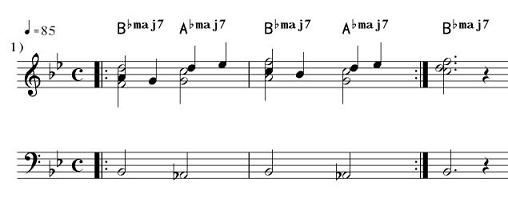
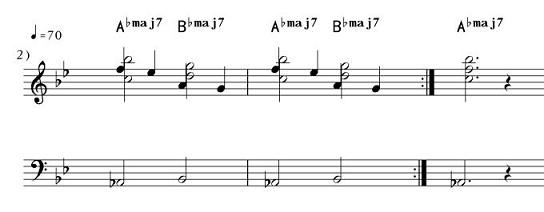
03/05/2004 Who's Listening You never know who's listening. I always remind myself of that when I'm on a gig. Especially when it seems that no one is listening. Today I got a note in the mail that made me think: at any given moment, someone somewhere may be listening to one of my CDs and my music may be bringing something of value into that person's life. A new friend of ours -- who we have not met but only know through email -- had ordered a copy of Act One, and on the invoice she wrote me a nice note: "Thanks so much for helping make our anniversary even more special. Act One was the perfect background music for our fondue." You never know who's listening. 01/19/2004 Know What Tonight, while Mal gave me a Reiki treatment, I listened to Mitchell-Ruff Breaking the Silence. This was the first time I listened to their version of Brahm's lullaby. Marvelous invention in their rendition. As I was listening, I thought, "I want to know what he knows." There's knowledge behind his playing. Stravinsky, Rachmaninov, Chopin. Made me think how nice it would be to listen to some classical music while looking at the score. It's been a long time since I've done that. Mal had lit a lot of candles, so after my session, when she went into the kitchen to cook dinner, I practiced in the candle-lit living room. Everything flowed smoothly. I warmed up with scales, but rhythmically, and leaving some notes out, making them more melodic. Mitchell inspired me. 01/19/2004 Links I miss having gigs. I haven't had a gig in two months. Tonight I got a message from a guy who was having problems downloading my sound clips, so I checked the links, and while listening to the duo cuts, I thought, "My playing sounds pretty good!" It doesn't always sound good to me. Listening made me want to get out and play some more duo gigs. Maybe I'll contact Steve Wark. 01/13/2004 Know notes Alex Radulescu was a Romanian who taught guitar in the Berklee guitar department when I was first teaching there. He had a wonderful Romanian accent. He used to call me "Steve Carrrrrterrrr, maaan!" Alex told a great story about sight reading. In Romanian, when you ask if someone can read music, you use a phrase that roughly translates to "Do you know notes?" Alex told of a guitarist who came in to the conservatory for an audition. The teacher asked him, in Romanian, if he could read music ("Do you know notes.") The student answered, in Romanian, "Of course I know notes." The teacher then put a piece of music on the music stand in front of the student. The student's eyes lit up as he pointed to the music and said, "Yes! Those are notes! Those are notes!" 01/09/2004 Phrasing and Taste 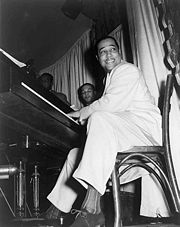
This morning, in the dentist's chair, I listened to a tape of Duke Ellington's band. I needed something that I could focus on, and Duke's music is always captivating. I noticed, once again, how well his band phrased. It reminded me of Charles Olson's comment that the best way to develop taste is to learn from your betters. Hearing Duke phrase "In a Sentimental Mood," I realized that the guys in the band listened to Duke, and learned phrasing from him. And of course Duke listened to them and learned phrasing from them. Of course, what I'm calling phrasing here goes much beyond just articulation and accents. It has to do with the flow of time, and the overall balance of a piece. Even tone color has something to do with it. You can hear orchestral tone color even in Duke's piano playing. And his writing of background lines for the band shows his understanding of the influence of tone color on phrasing, and the influence of phrasing on tone color. I thought of Herb Pomeroy's comment: "Stan Kenton can write something for a 20-piece band, and any third-year student can figure out what he did. Duke can stand a trombone, a clarinet, and a violin in front of a microphone and no one can figure out what he did." Dynamics are at the heart of phrasing. Dynamics on every level, from the shape of the overtones, through the shape of a phrase, to the shape of the piece. I thought of Red Mitchell's comments on Bird. Something to the effect of: It's great that we have those recordings of Bird, but they couldn't capture Bird's dynamics. In one chorus he'd go from a whisper to a shout. Tonight I turned on the car radio and found myself in the third movement of Mozart's "Jupiter" symphony. I was parked, waiting for my wife, so I was glad to have some good music to listen to. But soon I got really irritated with the conductor. Of course, I didn't know who it was, but I guessed it was Bernstein. The phrasing was terrible. I wondered how some conductors could get an orchestra to play a stacatto such that every note dies a small death. No forward motion in the music. In the last movement, I became convinced that it was Bernstein: the dynamics exagerrated and grotesque. He treated those eighth-note rhythms, the ones that Beethoven used in the fifth symphony, as if this were Beethoven. Mozart is not Beethoven, maestro. As it turned out, it was Bernstein. I have a recording of Carlo Maria Giulini conducting the "Jupiter." The phrasing is perfect. As is the phrasing on his version of Beethoven's sixth. What does all this have to do with jazz guitar? Everything. Some days I think that phrasing is all that matters. It's what identifies you. It's who you are. 01/07/2004 Exercises 
Ron Carter. Interview in Notes and Tones. What about your fingers? Do you do any special exercises? I'm really opposed to specific exercises. You see piano players who sit and tap their fingertips individually on tabletops all day. You see bass players who take a rubber ball or a hand grip. It may give you strength, but it does not give you control; I may not have the strongest physical hand, but I have the ultimate control of all my fingers independent of each other. For me the key word is finger control rather that strength. Today bass players have been caught up in raising their strings a little higher than normal to get a bigger sound and make their hands stronger. All it does is make their sound less attractive. It makes the sound much harder, but it tires them quickly. Besides, when a string is that taut, it cannot vibrate to its normal length, because the note is physically shorter. The decay period for this note is shorter than if they were to lower the bridge, say, an eighth of an inch. When the string is not so tight, it vibrates much more freely and is much longer. This makes the body of the bass, which is nothing but a big sound chamber, vibrate at much more frequent vibrations, so you get a much warmer sound. This is my thing. I try to get as warm a sound as I can and use as little physical effort as possible to produce it. It must take some strength. Not necessarily. I think it boils down to knowing how much energy it takes to hold the string to the fingerboard without rattling. I call it energy. Energy means a force. If you just drop your arms down and let them relax, you'll feel the gravity pulling your hands down. That's force. That doesn't mean you're strong; it's a natural energy. When you say strength, everybody does this: They clench a fist and get real tense. All you do is get tired. I think in terms of the natural energy which is already there, and applying this natural energy to the bass to get the most natural sound I can. Bass players are into the thing of pressing down as hard as they can. Let me give you a little scientific example. Take a twenty-ton TNT explosion: You get X-Y-Z decibels in sound. Now if you take a forty-ton TNT explosion, you only get ten. The bigger the explosion, the more the atoms cancel one another out, so you get a smaller sound effect. Bass players who play so hard with both right and left hands are generally feeding more vibrations into the bass than the bass can tolerate. So they just cancel one another out: the sound comes out smaller. The trick is to find at what level of physical energy you can expand to get the maximum sound without overfeeding the bass with these physical vibrations. Pound for pound, I'm probably not the strongest physical player, but I'll go out on the limb and say that I doubt there is another player who has more independence and coordination than I have. I dare say that if you could measure my sound vibration against the strongest player, his sound would not match mine in color, in length or in strength. A strong, penetrating sound. Miles is not a very strong player -- not like some trumpet players we could think of -- but his sound is so intense that it seems stronger than it is. It's incred-ible, man! That's my approach to the instrument, get-ting the most out of it by exerting the minimum physi-cal effort. Bass players are required to play all night. You are back there chomping. The piano player lays out and the horn player goes to the bar and has a drink, so the bass player and the drummer got it. There must be some way of performing to your maximum level without having to fall out between sets. I've seen cats do it, and you have, too. They are physically exhausted. I may not work a gig for a month, but because I think in relaxed terms, I can play as long as a bass player who has worked every night for the same period. What I hear I try to match not by overplaying, but by finding how much underplaying I can do and still get the big sound I have been identified with. That's gotten to be my trademark -- a big, fat sound. When they start paying bass players by the pound, I start getting worried. Right now it's by the sound, so I have a little while to go. pp. 58f. |
